On Wednesday, September 23, 2020, Reza Khandan, the husband of Nasrin Sotoudeh, announced on Twitter that his wife had been returned to prison after five days in Taleghani Hospital. He said she had not received any medical treatment while in the hospital.
Sotoudeh, a human rights activist and lawyer, is on hunger strike. "This action means nothing more than putting her in danger of death," Khandan wrote.
The families of Saba Kordafshari, Rezvaneh Khanbeigi, Mojgan Kavousi, Samaneh Norouz Moradi and Atena Daemi have also reported that their loved ones are in poor health and have been denied access to medical services.
***
Nasrin Sotoudeh was taken to Taleghani Hospital on Saturday, September 19. After weeks of being on hunger strike, she is suffering from severe weakness and fatigue, heart problems, shortness of breath, and low blood pressure. "Prison officials prevented the family from seeing my wife,” her husband Reza Khandan told IranWire. “We are not told anything about her medical situation."
He explained that he and his sister-in-law had waited at the hospital for eight hours every day, hoping to see Sotoudeh, even if for a brief period in the corridor when she was being transferred from one part of the hospital to another. "Once they were moving her to another room and the officer saw us watching her and that we wanted to talk to Nasrin, and pushed her wheelchair inside the new room quickly. They are afraid of the prisoner visiting family. They don’t provide information about the patient's medical condition."
Saba Kordafshari
Saba Kordafshari, 22, has been sentenced to 15 years in prison for protesting against Iran’s mandatory hijab law through the White Wednesdays campaign. She has been held in Evin Prison since April 2019 and is suffering from severe stomach pain and bleeding. However, prison officials have so far ignored her condition and have refused her treatment and medical tests.
IranWire spoke to a source who knew about Kordafshari’s condition: "Prison officials took Saba to Taleghani Hospital with Ms. Sotoudeh on Saturday, September 19. She had a gastric ultrasound, but according to a specialist doctor who treated her a month ago, she should have had endoscopic and colonoscopic tests. She and her family were not even told the results of the ultrasound. She was later returned to prison. Her family still doesn’t know what the results of the ultrasound test was!"
According to the source, when Saba Kordafshari was released from prison, her mother, Raheleh Ahmadi, who is on the same ward, was told that her daughter would be taken to the Shohada Hospital in Tehran’s Tajrish Square. "Ms. Ahmadi called her husband and told him to go and see their daughter. But the family found out that Saba had been taken to Taleghani Hospital. Simply put, the officials did not want her family to see Saba in the hospital for even a few minutes. What has she done?"
Families of sick prisoners are required to pay for all medical and hospital expenses. But prison officials refuse or avoid providing them with information about the treatment, the diagnosis or the prognosis.
Nasrin Sotoudeh was taken to Taleghani Hospital on Saturday. After weeks of being on hunger strike, she is suffering from severe weakness and fatigue, heart problems, shortness of breath, and low blood pressure. "Prison officials prevented the family from seeing my wife,” her husband Reza Khandan told IranWire. “They are not told anything about her medical situation."
He explained that he and his sister-in-law had waited at the hospital for eight hours every day, hoping to see Sotoudeh, even if for a brief period in the corridor when she was being transferred from one part of the hospital to another. "Once they were moving her to another room and the officer saw us watching her and saw that we wanted to talk to Nasrin, and pushed her wheelchair inside the new room quickly. They are afraid of the prisoner visiting family. They don’t provide information about the patient's medical condition."
On Saturday, September 19, Saba Kordafshari’s sister Soghand posted on Twitter: "The women's ward at Evin did not contact us, and they also told my mom that they had taken her to Shohada Hospital in Tajrish, but they actually took her to Taleghani Hospital. They did not want us to go to the hospital so they said they had taken her to Tajrish. We found out when she was returned to the prison. If we do not know where they have taken her, how can we pay for her treatment?"
"When did Saba become so dangerous that we cannot even see her in the hospital?” Soghand Kordafshari said in another tweet, accusing the prison authorities of lying.
Saba Kordafshari already had a stomach condition before going into prison, and she had been under medical supervision. After her arrest, her condition worsened, and she began to bleed badly. "Solitary confinement and the pressures of the interrogation have affected Saba's stomach and her nerves,” the source IranWire spoke to said.
“She has bled heavily many times since she was imprisoned a year and a half ago. After a test, the prison doctor confirmed she had gastrointestinal bleeding and recommended she be transferred out of prison for treatment. But prison officials have been postponing this for months. Her father talked to a doctor who had treated her before and prescribed some medicine. But she got worse. Then her doctor said he could not prescribe medicine for her and he needed to see her. But prison officials opposed Saba being examined by her former doctor."
According to the source, Saba Kordafshari was taken to Taleghani Hospital in early August wearing hand and leg cuffs. "Because she had been taken to the hospital in such a way, the doctor was scared and did not even examine her. He only prescribed an endoscopy and a colonoscopy for her."
However, six weeks on, Saba Kordafshari has not been taken to hospital for these tests.
"No explanation has been given to her family," the source said. "They just say that the prosecutor should order the prisoner to be sent to medical centers.” So the situation remains unresolved and Kordafshari is sick in prison.
The source said the family are simply requesting “the minimum rights of a prisoner as a human being be respected,” and then added: "A human being should not be tortured. The fact that Saba has not been sent to the hospital for treatment is torture. Why should a young girl suffer from stomach pain for months?"
International human rights activists have condemned Kordafshari’s detention and urge the authorities to give her the medical attention she needs. On September 21, Amnesty International tweeted that she had been "unjustly jailed for her human rights work, including campaigning against Iran’s discriminatory forced veiling laws.”
Kordafshari Charged with “Prostitution”
Saba Kordafshari was targeted because of her involvement in the White Wednesdays campaign, in which women post photographs of themselves on social media wearing white scarves as a protest against Iran’s law that women must wear hijab in all public places, and even in their cars.
She was arrested by security forces at her father's house on June 1, 2019 and transferred to the Vozara Street detention center. A day after her arrest, she was transferred to Branch 1 of the Revolutionary and Public Court of the 21st District of Tehran, also known as Ershad Court, and charged with "propaganda against the regime," "conspiracy and collusion through contact with foreign media," and "encouraging corruption and prostitution” by not wearing hijab.
She was detained for 10 days, after which she was transferred to Gharchak Prison in Varamin. She has been held in the women's ward at Evin Prison since late August 2019.
Her trial took place on August 7, 2019 in Branch 26 of the Revolutionary Court, presided over by Judge Iman Afshari.
She was sentenced to a total of 24 years in prison on charges of "conspiracy to commit a crime against national security,” "propaganda activities against the regime," and "encouraging corruption and prostitution.” The longest sentence handed down to her was 15 years in prison on charges of inciting corruption and prostitution. The sentence was upheld by an appeals court.
A month after Saba's arrest, her mother, Raheleh Ahmadi, who had gone to Evin Prison court to follow up on her daughter’s case, was also arrested.
Ahmadi was also sentenced by Branch 26 of the Revolutionary Court to three years and six months in prison on charges of "conspiracy and collusion against national security through cooperation with enemy media." She had protested against her daughter's detention by posting videos on social media.
Mojgan Kavousi and Rezvaneh Khanbeigi
Monireh Arabshahi, Yasman Ariani and Mojgan Keshavarz are also being held at the women's ward at Evin Prison, along with many other women who are being punished for protesting against the mandatory hijab law.
Mojgan Kavousi and Rezvaneh Khanbeigi are also in need of special care and urgent surgery. As with Kordafshari, their medical treatment has been postponed and they have not been informed as to when they will receive it.
Mojgan Kavousi, a Kurdish civil activist, is in urgent need of surgery to remove hemorrhoids, and despite being diagnosed by both prison doctors and doctors outside the prison, judicial authorities have so far refused to admit her to hospital.
Kavousi has been on a hunger strike since September 1 to protest against the conditions under which she is being held. She told her family on the phone that she would continue the strike until her medical condition was taken into account and her human rights were restored.
She was first arrested at her home in Nowshahr during the November 2019 nationwide protests and later sentenced to 36 months in prison on charges of "propaganda against the regime," "membership to opposition groups," and "encouraging people to disrupt public order.”
After the verdict, she was ordered to begun her sentence and taken into custody and transferred to Evin Prison on May 20, 2016 to serve her sentence and transferred to Evin Prison.
Rezvaneh Khanbeigi suffers from seizures and epilepsy. Despite numerous requests for medical leave, this has not yet been approved. Rezvaneh is also on a hunger strike. She demands access to medicine and medical treatment and the implementation of a new law to reduce imprisonment terms and regulations for ill prisoners.
In April this year, Khanbeigi’s husband Behfar Lalehzari told IranWire that he took his wife's medicine to her on an almost weekly basis, handing it over to the prison authorities, but most of the medicine never made it to his wife and was somehow lost between the entrance to the prison and the medical center. His wife suffers from severe seizures if she does not take her medication.
Rezvaneh, 30, was first arrested in 2018 for participating in peaceful protests and civil action to secure the release of political prisoners. She was tried in a court presided over by Judge Iman Afshari on charges of "manifesting and collusion against national security" and "propaganda activities against the regime," and was sentenced to four and a half years in prison.
Rezvaneh was released on bail and was waiting for the appeals court verdict when she was arrested for the second time during November 2019 protests. This time, she was sentenced by Branch 24 of the Revolutionary Court of Tehran to six years in prison on the same charges, of “conspiracy against national security” and “propaganda activities against the regime.”
Samaneh Norouz Moradi and Atena Daemi
Samaneh Norouz Moradi, another inmate at Evin Prison’s women’s ward, suffers from lupus and breast cancer. However, her medical leave has also not been approved for reasons that have not been explained.
Moradi was arrested in September 2017 by Ministry of Intelligence agents on charges of "supporting opposition groups through her posts on social media." Branch 26 of the Revolutionary Court sentenced her to three years and nine months in prison. Moradi was transferred to Evin Women's Prison in May 2019 after being summoned to court. On July 30, 2016, a source told IranWire that on Monday, July 30, 2016, several intelligence agents blindfolded and handcuffed Norouz Moradi from Evin Prison and transferred her to a hospital she had never been to before to receive treatment.
After an initial examination, the hospital’s doctors refused to admit Moradi and informed the Revolutionary Guards’ intelligence agents accompanying her that her condition was so acute that she should be taken and admitted to Imam Khomeini Hospital as soon as possible. The security agents refused, and returned her to Evin Prison. She had received no treatment.
Civil activist Atena Daemi has been suffering from a gastrointestinal and glandular infection in one of her breasts for several years, and is also suspected of having Multiple Sclerosis. During her years in prison, her treatment has often been delayed.
Daemi, 32, was arrested on October 20, 2014 by the Revolutionary Guards Information Protection Organization for her activism. On March 14, 2015, she faced charges of "propaganda against the regime," "conspiracy and collusion,” “crimes against national security", "insulting the Leader,” "insulting the founder of the Islamic Republic,” and "concealing evidence of a crime" in a court presided over by Judge Mohammad Moghiseh. She was sentenced to 14 years in prison.The case went to the court of appeals to challenge the charge of concealing evidence, but it, as all other charges before, were upheld.
n accordance with Article 134 of the Islamic Penal Code, her sentence was amended to five years in prison.
On July 5, 2020, Daemi was due for release. However, two days before the release date, she was sentenced by Branch 24 of the Revolutionary Court to two years and one month in prison and 74 lashes for "propaganda against the regime" and "disrupting prison order." The two charges were brought against her while she was in prison, and were said to be linked to her protest chants during meeting behind glass with her family or during the hours that prisoners were instructed to remain silent and signing statements that opposed the execution of political prisoners.
Atena Daemi remains in the women's ward at Evin Prison, serving a new sentence and enduring untreated illnesses.
Like Sotoudeh, Kordafshari, Kavousi, and Khanbeig, Daemi has been harshly treated and denied basic human rights and a fair trial because of her work to protect her own rights, and the rights of fellow citizens and prisoners.
visit the accountability section
In this section of Iran Wire, you can contact the officials and launch your campaign for various problems




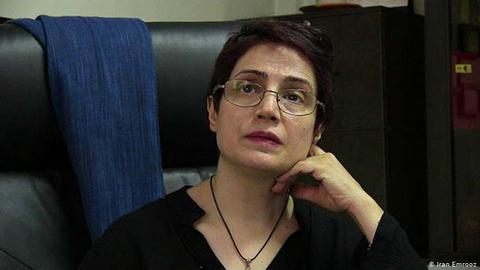
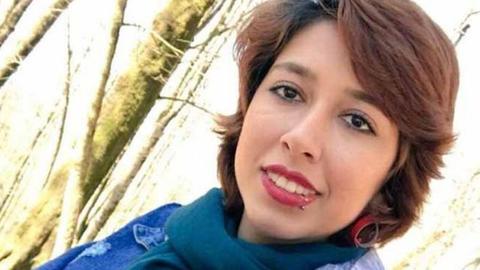
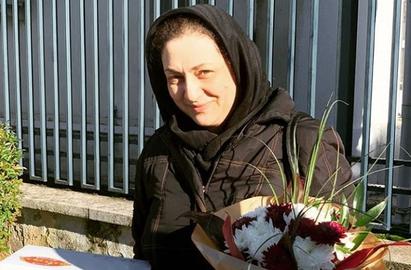
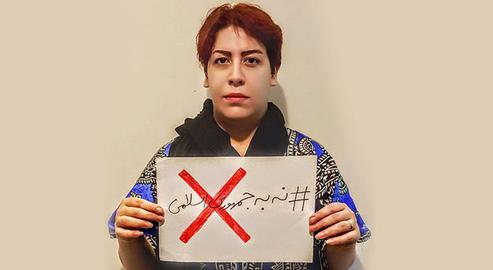
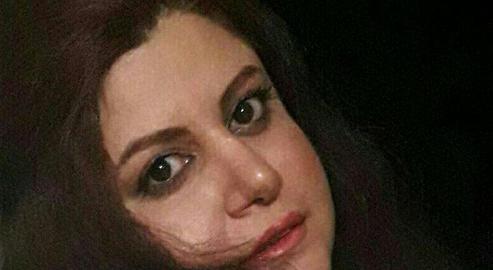
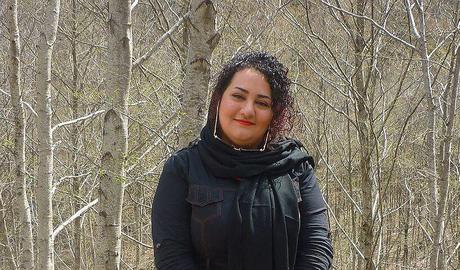




















comments